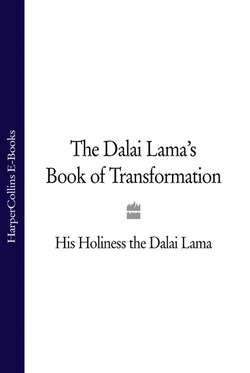Читать книгу The Dalai Lama’s Book of Transformation - Далай-лама XIV, Литагент HarperCollins USD, Дуглас Абрамс Арава - Страница 7
PART ONE THE BASIS OF TRANSFORMATION
ОглавлениеThe whole point of transforming our heart and mind is to find happiness. We all have the natural desire to be happy and the wish to overcome suffering. This is a fact, so we can make it our starting-point.
Before developing this point in more detail, however, let us look very briefly at the nature of experience. Broadly speaking, our experiences fall into two categories. One type of experience is more connected with our bodies, and occurs mainly through our sense organs, while the other type is more related to what can be called ‘the mental consciousness’ or ‘the mind.’
So far as the physical level of experience is concerned, there is not much difference between ourselves and other animal species. Animals, too, have the capacity to feel both pain and well-being. But what perhaps distinguishes us human beings from other forms of life is that we have far more powerful mental experiences in the form of thoughts and emotions.
The fact that there are two broad categories of experience has some interesting implications. Most importantly, if a person’s basic state of mind is serene and calm, then it is possible for this inner peace to overwhelm a painful physical experience. On the other hand, if someone is suffering from depression, anxiety, or any form of emotional distress, then even if he or she happens to be enjoying physical comforts, he will not really be able to experience the happiness that these could bring. So this shows that our state of mind, in terms of our attitudes and emotions, plays a crucial role in shaping the way we experience happiness and suffering. The lo-jongteachings on transforming the mind offer a series of methods by which we can channel and discipline our mind, and so create the basis for the happiness we are seeking.
We all know that there is an intimate connection between physical well-being and emotional well-being. We know, for example, that physical illnesses affect our state of mind, and that, conversely, a greater degree of physical well-being contributes towards greater mental ease. Since we commonly recognize this correlation, many of us engage in physical practices and exercises to help bring about that physical well-being which will contribute to our mental refreshment. There are also certain traditional practices that are aimed at training our energy patterns; these are called prana yogas, or ‘yogas of the wind energy.’ These days, yogic exercises have become very popular in the modern world, too, and this is precisely because many people have found that through yoga they can achieve a degree of physical health that leads to better mental health. The approach that is suggested by the lo-jongteachings is slightly different, however. They concentrate directly on the development of the mind itself, through the transformation of our attitudes and ways of thinking.
The key to transforming our hearts and minds is to have an understanding of the way our thoughts and emotions work. We need to learn how to identify the opposing sides in our inner conflicts. With anger, for example, we need to see how destructive anger is, and, at the same time, realize that there are antidotes within our own thoughts and emotions that we can use to counter it. So, first, by understanding that afflictive thoughts and emotions are destructive and negative, and, second, by trying to strengthen our positive thoughts and emotions, which are their antidotes, we can gradually reduce the force of our anger, hatred and so on.
The way to examine how thoughts and emotions arise in us is through introspection. It is quite natural for many different thoughts and emotions to arise. When we leave them unexamined and untamed this leads to untold problems, crises, suffering and misery. This is why we need to adopt the conscious discipline we spoke of earlier: in order to reduce the power of a negative emotion like anger or hatred, we need to encourage its antidote, which is love and compassion.
It is not enough to recognize that this is what is required, just as it is not enough simply to wish that love and compassion should increase in us. We have to make a sustained effort, again and again, to cultivate the positive aspects within us, and the key here is constant familiarity. The nature of human thoughts and emotions is such that the more you engage in them, and the more you develop them, the more powerful they become. Therefore we have to develop love and compassion consciously in order to enhance their strength. We are, in fact, talking about a way of cultivating habits that are positive. We do this through meditation.
